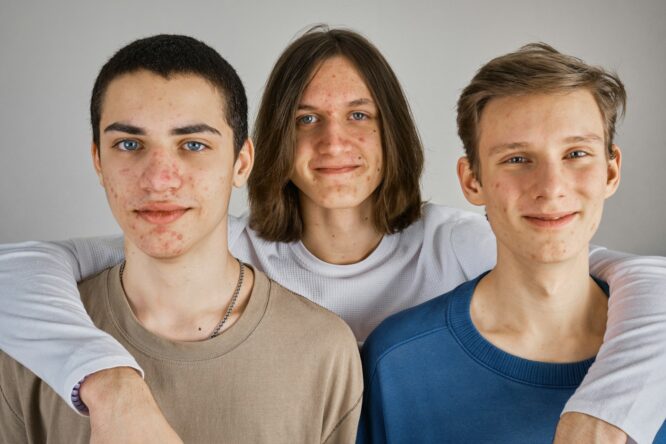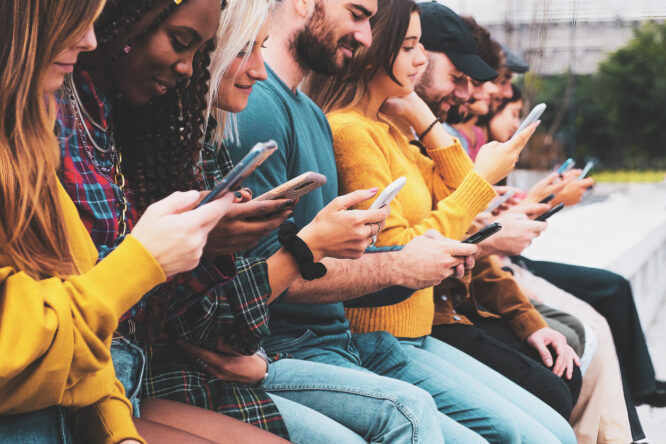Every generation thinks they’ve cracked the code—until they’re old enough to become the punchline.

Boomers got hit with “OK, boomer” memes. Millennials got blamed for killing everything from chain restaurants to fabric softener. And Gen Z? They’re next in line. One day, today’s crop-top-wearing, therapy-talking, internet-fluent 20-somethings will be tomorrow’s “back in my day” crowd. So here’s a sneak peek at the stereotypes Gen Z might be stuck with once they reach boomer age, and how the tables might turn. Sorry, kids—it’ll happen to you one day!
1. “They’re always glued to their neural implants.”

Right now, it’s TikTok and phones. But fast-forward 40 years, and you can bet Gen Z will have some futuristic version of scrolling, probably straight from a chip in their head. And just like older generations complain about phones at the dinner table, the next-gen youth will be roasting Gen Z for being “too plugged in.”
Imagine someone born in 2080 asking, “Can’t you just enjoy a walk without streaming 300 memories to your cortex?” The irony will be rich, and so will the eye-rolls when Gen Z starts saying, “You just don’t understand how things used to be.”
2. “They’re obsessed with emotions and over-analyse everything.”

Gen Z’s big on therapy, mental health awareness, and emotional processing. However, give it a few decades, and that could morph into a stereotype about being overly sensitive or emotionally indulgent.
The same people who fought to normalise setting boundaries might be teased by future teens who just want to joke around without a “trauma unpacking session.” Gen Z’s emotional intelligence will become “too deep for no reason” once it’s the norm.
3. “They ruined the metaverse with their weird sense of style.”

What’s cool now—chunky trainers, Y2K revival, baggy cargos—will probably look totally unhinged to whatever post-Z generation emerges. They’ll mock the old avatar styles Gen Z used to flex in the metaverse the same way we laugh at 2000s eyebrows. Expect future teens to say, “Why did everyone dress like glitchy Sims back then?” as Gen Z insists, “It was a vibe, okay?” Nostalgia will live on, but not without getting absolutely roasted first.
4. “They take everything personally online.”

As the first fully digital-native generation, Gen Z already gets labelled as a little too online. Once they’re older, their internet habits might be seen as hypersensitive or overly reactive to every trending topic. Picture a 75-year-old Gen Z grandparent subtweeting from their kitchen while Gen Alpha 2.0 sighs, “Ugh, they’re still doing cancellation callouts in 2065?” It’ll be the full-circle moment they never saw coming.
5. “They’ll never shut up about being ‘chronically online.’”
 Source: Unsplash
Source: Unsplash Gen Z’s whole identity is intertwined with the internet—memes, slang, microcultures. But by the time they hit retirement age, that pride might look more like an outdated personality trait than a badge of honour. Future generations might not be impressed by someone who “remembers when BeReal flopped.” Instead, they’ll gently mock how Gen Z can’t go five minutes without referencing 2010s Tumblr or “the great TikTok split of 2025.”
6. “They’re stuck in their influencer-era mindset.”

Gen Z grew up in the age of self-branding, content creation, and aesthetic curation. However, give it a few decades and that habit of turning everything into a “personal brand” might be seen as wildly cringe by the next wave of minimalists. While future kids live blissfully unbothered by follower counts, Gen Z might still be posting GRWMs at 70. “Why does Gran keep filming skincare tutorials from the care home?” they’ll ask. The hustle just never stops.
7. “They always think they’re the most inclusive generation.”

Right now, Gen Z’s pushing hard for diversity, inclusion, and fluidity in how we see gender, identity, and relationships. But eventually, they might be seen as outdated by future standards, even if they helped set the stage.
In 40 years, their progressive ideas could be called “rigid” or “binary” by a generation that sees things even more expansively. And they’ll be just as shocked to be on the receiving end of that critique as boomers were when they got hit with “you’re not woke enough.”
8. “They’re always broke but still buying iced coffee robots.”

Financial instability has been a defining trait for Gen Z—sky-high rent, gig work, and the cost of existing. But their spending habits? Still full of little luxuries. Think subscription boxes, gadgets, and smart everything. One day, future teens will side-eye their spending the same way Gen Z judged boomers for hoarding fine china. “They were always broke but somehow had six delivery drones and a mood-lighting fridge.”
9. “They act like they invented burnout.”

Gen Z has normalised talking about burnout, and rightly so. But in the future, they might be accused of over-labelling stress or making every rough patch into a “mental health era.” Future generations might appreciate their openness, but also get tired of hearing how “no one had it harder than the remote workers of 2020.” The narrative might need a refresh once they’re not the ones burning out anymore.
10. “They’re obsessed with nostalgia for decades they barely lived through.”

From ’90s cameras to 2000s fashion, Gen Z loves romanticising the recent past. Of course, by the time they’re older, they might still be clinging to nostalgia no one else shares. Think flip phone revivals in 2070 while the youth just blink at them in confusion. They might insist on using retro emojis or watching ‘classic’ YouTube vlogs while their grandkids wonder why they’re obsessed with blurry tech and glitchy aesthetics. The Y2K nostalgia loop will never die—it’ll just age.
11. “They’re the emotionally drained generation that never learned to rest.”

Despite all the talk of boundaries and self-care, Gen Z’s been raised in hustle culture 2.0—where you’re still expected to monetise your hobbies and be productive even while ‘resting.’ That cycle’s hard to escape. In the future, they might still be talking about burnout while working five side hustles post-retirement. Their grandkids might lovingly call them “the tired generation,” even as they sip adaptogenic teas and journal through it.
12. “They think memes are a valid historical source.”

Gen Z has grown up learning through screenshots, memes, and rapid-fire threads. However, when they start referencing meme culture in actual debates with their future kids, it’s going to sound a bit… unhinged. “As we learned from the 2020 Bernie meme,” they’ll start, and the younger generation will just stare blankly. What’s witty now could one day feel like reading hieroglyphics to someone who never lived through the chaos of peak meme internet.
13. “They’ve still got main character syndrome at 75.”

The “main character” mindset is big with Gen Z—life’s a movie, and they’re the star. But one day, the world won’t revolve around their playlists or mood boards, and that narrative might start to show its age. Future generations might be more collective-minded or off-grid, and watching Grandma dramatically film her sunset walk with background music might become the new “boomer selfie in the car.” The spotlight fades eventually, but Gen Z might not go quietly.




